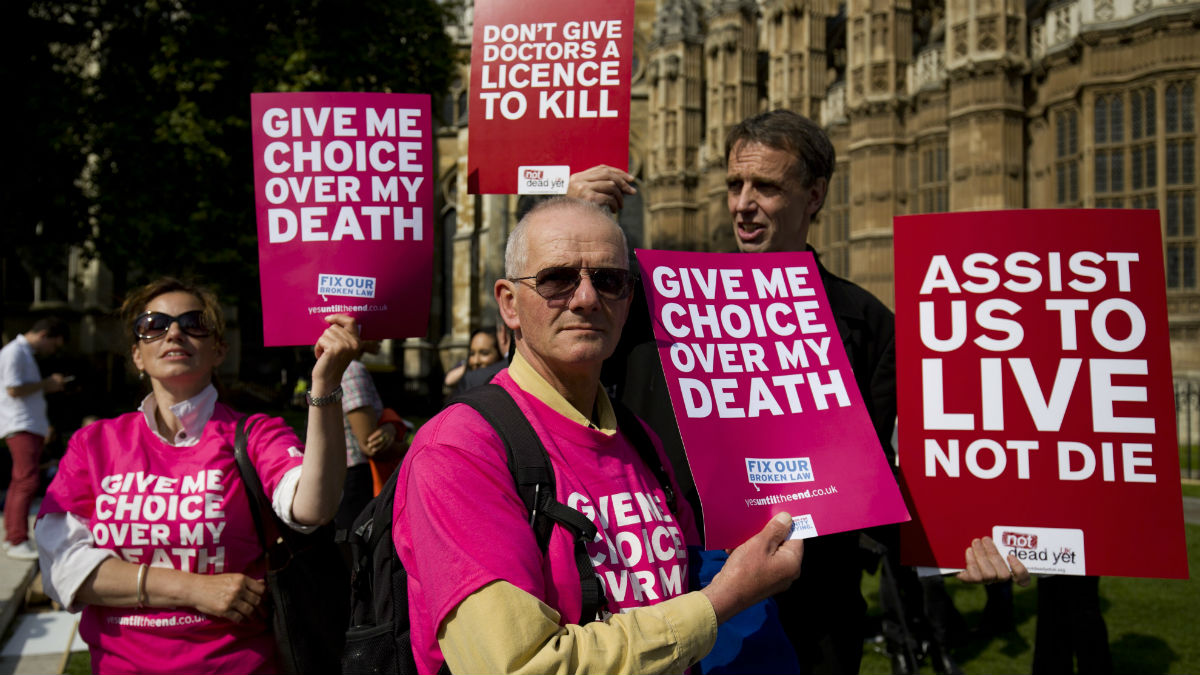Assisted dying bill: MPs reject 'right to die'
New bill could have allowed patients to end their own lives if they were terminally ill

A free daily email with the biggest news stories of the day – and the best features from TheWeek.com
You are now subscribed
Your newsletter sign-up was successful
MPs have voted against a bill that would have introduced a 'right to die' after their first debate on the subject in 18 years. The House of Lords debated the matter in the last parliament (see below), but their bill did not make it to the Commons.
After what the BBC describes as a "passionate" debate, 118 MPs voted in favour of the Assisted Dying Bill and 330 voted against. The bill, introduced by Labour's Rob Morris, had topped the Private Members' Bill ballot after the general election.
It proposed that two doctors and a High Court judge would have to agree to assisted dying for any patient, meaning they would have to be convinced that the patient was mentally competent, had less than six months to live and was aware of the alternatives.
The Week
Escape your echo chamber. Get the facts behind the news, plus analysis from multiple perspectives.

Sign up for The Week's Free Newsletters
From our morning news briefing to a weekly Good News Newsletter, get the best of The Week delivered directly to your inbox.
From our morning news briefing to a weekly Good News Newsletter, get the best of The Week delivered directly to your inbox.
The bill would not have allowed euthanasia – it would only have permitted patients to administer medication to end their own lives.
In a blog post ahead of the debate, Marris wrote: "I value life and I do understand that some people believe very deeply that ending one's own life is always wrong. Nevertheless, the depth and sincerity of their belief should not mean that they deny choice to those of us who do not share their beliefs."
The Archbishop of Canterbury, Justin Welby, has said that if the bill became law it would mean suicide was "actively supported" instead of being viewed as a tragedy. Alistair Thompson, from Care Not Killing, also said the legislation is "dangerous". However, Dignity in Dying said that without a change to the law, terminally ill patients would continue to travel to Dignitas to die.
The result of the vote means that there will be no immediate change to the law, under which euthanasia, which is considered as manslaughter or murder, is illegal in England. The Suicide Act of 1961 makes it an offence to encourage or assist a suicide or a suicide attempt in England and Wales. Anyone doing so could face up to 14 years in prison.
A free daily email with the biggest news stories of the day – and the best features from TheWeek.com
Last summer, David Cameron said he was "not convinced that further steps need to be taken" to change current laws.
Assisted dying: the pros and cons of the Lords bill
15 January
The Assisted Dying Bill continues its progress through the House of Lords tomorrow, as it goes before the committee of the upper house.
Critics of the Bill say existing laws are in place to protect the most vulnerable people in society, but campaigners argue that the right to die with dignity should be available to all.
What is the current law?
Euthanasia and assisted suicide are both currently illegal under English law. It is a criminal offence to encourage or assist a suicide under the 1961 Suicide Act. Those who do so could face a prison sentence of up to 14 years.
What is the Bill?
The Bill, devised by former Labour Lord Chancellor Lord Falconer, will allow doctors to prescribe a lethal dose of medication to patients who have been deemed to have less than six months to live.
The proposed legislation only applies to "mentally competent" adults with terminal illnesses. It provides strict legal safeguards to ensure the legislation is not abused and would require patient to self-administer the drugs, the Daily Telegraph reports.
What will happen tomorrow?
The Assisted Dying Bill has reached the committee stage of its process through the House of Lords, during which it will be examined in detail by peers. If it is eventually passed by the Lords, MPs are likely to be given a free vote. However, with a general election less than four months away it seems likely that the bill will run out of time.
Before Christmas 80 prominent figures, including former Archbishop of Canterbury Lord Carey, called on politicians to ensure that the bill would be allocated parliamentary time after the election. Refusing to allow a debate to go ahead would be "heartless", they said in a letter to the Telegraph.
How have people reacted to the Bill?
Liberal Democrat care minister Norman Lamb told the BBC's Newsnight that people should be able to "make their own decision about their life".
Professor Stephen Hawking argues that not implementing such a bill is form of discrimination against people with disabilities as it denies them "the right to kill themselves that able-bodied people have", he told the BBC.
But David Cameron has revealed that his is "not convinced", warning that "people might be pushed into things they don't actually want for themselves" but said he was happy for the debate to be held.
Cancer specialist professor Karol Sikora told Newsnight that changing the law would put the decision on whether or not to end a patient's life in the hands of doctors and create "death squads" within the NHS.
The Church of England remains opposed to the Bill, but former archbishop of Canterbury Lord Carey has come out in support of assisted dying, saying he changed his mind after considering cases where patients suffer from locked-in syndrome and were suffering needlessly. Archbishop Desmond Tutu has also expressed his support for assisted dying.
What are assisted dying laws abroad?
Assisted suicide has been legal in Switzerland since 1942. In the US states of Oregon and Washington, it has been legalised but is heavily regulated. Belgium, Luxembourg and the Netherlands have legalised voluntary euthanasia, with similar legislation being considered in France, according to the BBC.
-
 6 of the world’s most accessible destinations
6 of the world’s most accessible destinationsThe Week Recommends Experience all of Berlin, Singapore and Sydney
-
 How the FCC’s ‘equal time’ rule works
How the FCC’s ‘equal time’ rule worksIn the Spotlight The law is at the heart of the Colbert-CBS conflict
-
 What is the endgame in the DHS shutdown?
What is the endgame in the DHS shutdown?Today’s Big Question Democrats want to rein in ICE’s immigration crackdown
